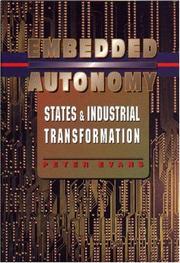| Listing 1 - 4 of 4 |
Sort by
|

ISBN: 0803991770 Year: 1994 Publisher: New Delhi Thousand Oaks, Ca. Sage Publications
Abstract | Keywords | Export | Availability | Bookmark
 Loading...
Loading...Choose an application
- Reference Manager
- EndNote
- RefWorks (Direct export to RefWorks)

ISBN: 0262122219 9780262122214 Year: 1999 Publisher: Cambridge, Mass. MIT
Abstract | Keywords | Export | Availability | Bookmark
 Loading...
Loading...Choose an application
- Reference Manager
- EndNote
- RefWorks (Direct export to RefWorks)
"In this book Youngil Lim explores the process by which the poverty-stricken agrarian economy of South Korea was transformed over the past three decades into a semi-industrial urban economy. The chief questions Lim addresses are: Where did South Korea's technological knowledge come from? What did the government and market do to nurture such rapid learning? Will a continuation of current policy enable South Korea to catch up with other OECD countries? What is the appropriate role of the National Research and Development Program within the framework of the National System of Innovation?"--Jacket.
Economic growth --- Economic production --- South Korea --- Industrial productivity --- Industrial policy --- Technology --- Technology and state --- Human capital --- Business enterprises --- Industrial organization --- Free enterprise --- Industrial productivity - Korea (South) --- Industrial policy - Korea (South) --- Technology - Korea (South) --- Technology and state - Korea (South) --- Human capital - Korea (South) --- Business enterprises - Korea (South) --- Industrial organization - Korea (South) --- Free enterprise - Korea (South)
Book
ISBN: 9788988095324 8988095324 Year: 2008 Volume: 38 Publisher: Seoul Jimoondang
Abstract | Keywords | Export | Availability | Bookmark
 Loading...
Loading...Choose an application
- Reference Manager
- EndNote
- RefWorks (Direct export to RefWorks)
Conglomerate corporations --- Big business --- Industrial policy --- Korea (South) --- Economic policy --- K9411 --- K9413.10 --- K9400.80 --- Korea: Economy and industry -- organization and systems -- conglomerates, Chaebŏl --- Korea: Economy and industry -- relations -- state --- Korea: Economy and industry -- history -- modern period, postwar period (1945- ) --- Conglomerate corporations - Korea --- Big business - Korea (South) --- Industrial policy - Korea (South) --- Korea (South) - Economic policy - 1988 --- -K9411

ISBN: 0691037361 069103737X 128273833X 140082172X 9786612738333 1400811538 1400802105 9781400821723 9781282738331 9781400811533 9780691037363 Year: 1995 Publisher: Princeton, N.J. : Princeton University Press,
Abstract | Keywords | Export | Availability | Bookmark
 Loading...
Loading...Choose an application
- Reference Manager
- EndNote
- RefWorks (Direct export to RefWorks)
In recent years, debate on the state's economic role has too often devolved into diatribes against intervention. Peter Evans questions such simplistic views, offering a new vision of why state involvement works in some cases and produces disasters in others. To illustrate, he looks at how state agencies, local entrepreneurs, and transnational corporations shaped the emergence of computer industries in Brazil, India, and Korea during the seventies and eighties. Evans starts with the idea that states vary in the way they are organized and tied to society. In some nations, like Zaire, the state is predatory, ruthlessly extracting and providing nothing of value in return. In others, like Korea, it is developmental, promoting industrial transformation. In still others, like Brazil and India, it is in between, sometimes helping, sometimes hindering. Evans's years of comparative research on the successes and failures of state involvement in the process of industrialization have here been crafted into a persuasive and entertaining work, which demonstrates that successful state action requires an understanding of its own limits, a realistic relationship to the global economy, and the combination of coherent internal organization and close links to society that Evans called "embedded autonomy."
Industrial economics --- Government --- Economic policy and planning (general) --- Third World: economic development problems --- Developing countries --- Computer industry --- Industrial policy --- Government policy --- #SBIB:012.IO --- #SBIB:35H435 --- #SBIB:33H13 --- Beleidssectoren: economisch en werkgelegenheidsbeleid --- Economische politiek --- Electronic industries --- Developing countries: economic development problems --- Computer industry - Government policy - Brazil --- Computer industry - Government policy - India --- Computer industry - Government policy - Korea (South) --- Industrial policy - Brazil --- Industrial policy - India --- Industrial policy - Korea (South)
| Listing 1 - 4 of 4 |
Sort by
|

 Search
Search Feedback
Feedback About
About Help
Help News
News